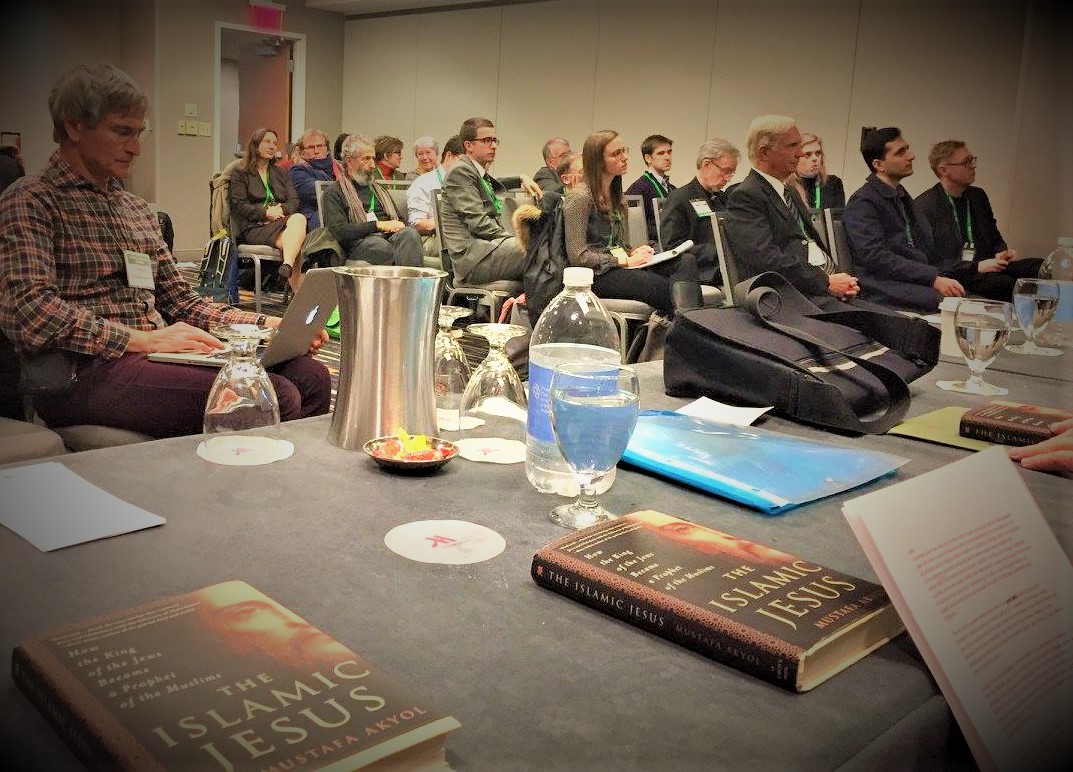The fifth Annual Meeting of the International Qur’ānic Studies Association, held in Boston from November 17-21, brought together many of the foremost scholars within qur’ānic studies, for four days of engaging panels, presentations, and roundtables on all aspects of the text and its reception. Taking place concurrently with the American Academy of Religion and Society of Biblical Literature conferences, IQSA served as a nexus for conversations which brought together new research from historians, philologists, Late Antique specialists, manuscript scholars, and many others.

Daniel Madigan (Georgetown Unviersity) and others participate in the joint session roundtable Discussion of Islam and Its Past: Jahiliyya, Late Antiquity and the Qur’an
The weekend began on Friday afternoon with the program unit on The Qur’ān and the Biblical Tradition with talks from Devin Stewart and Nicolai Sinai, focusing on Abraham’s lies and his general qur’ānic profile respectively, from Shari Lowin, on the nature of the Qur’ān’s claim that “the Jews say the Hand of God is chained” (Q. 5:64), Gavin McDowell, on the Qur’ān and Pirqe de-Rabbi Eliezer, and Faris Casewit, on Jesus’ sayings in al-Harrālī’s exegesis. This was followed by Gerald Hawting’s presidential address, entitled “The House and the Book”, which focused on the tensions between scripture and sanctuary, as early elements of the emergent Islamic movement, and for which Sean Anthony served as respondent.
Saturday kicked off with a lively roundtable on the new book Islam and Its Past: Jahiliyya, Late Antiquity, and the Qur’an (OUP, 2017), co-edited by Carol Bakhos, who chaired the session, and Michael Cook. The discussion focused on paradigms for the study of early Islam vis-à-vis the jāhilī and/or Late Antique milieux, from which it is seen to have emerged. The early afternoon saw a panel on various aspects of sūrat al-Aḥzāb, including its legislative content (Joseph Lowry), its relevance for blasphemy law (Matthew Anderson), the translation of verse 35 (Bruce Lawrence), and a comparative reading of sūra 45 (Ghazala Anwar). The late afternoon/early evening slot was the busiest of the weekend, with three concurrent panels: one on Mustafa Akyol’s new monograph The Islamic Jesus (Macmillan, 2017), one on the implications of sūra titles for the study of the Qur’ān, and one on reconceptualizing Late Antiquity before and after Muhammad.
The third day of the conference continued these conversations with Late Antiquity with a session dedicated to qur’ānic themes and rites seen against their Late Antique background. Abraham Winitzer began with a presentation on the Akkadian expression ‘kipir kishâdim‘ and its possible qur’ānic resonances. He was followed by talks from Javad Hashmi, on the influence of a jāhilī ethos on the Qur’ān’s view of just war; Johanne Christiansen, on the notion of processions; Ari Gordon, on Late Antique discussions of ‘liturgical direction’ and their potential importance for understanding the Qur’ān’s qibla; and Karen Bauer, on comparing the emotional content of the Qur’ān and pre-Islamic poetry. The afternoon concluded with another session from the unit on The Qur’ān and the Biblical Tradition, with presentations by Rachel Dryden (biblical angels in the Qur’ān), Holger Zellentin (the prohibition of incest), Thomas Hoffman (the doxological mode of religiosity in the Qur’ān), Gabriel Said Reynolds (biblical turns of phrase in the Qur’ān), and Cornelia Horn (oral and written transmissions between the Bible and the Qur’ān).

Members of the IQSA community gather over light refreshments at the General Reception following Gerald Hawting’s Presidential Address
The first panel of the final day began with some of the widest-ranging discussions of the weekend, under the theme of ‘Minority and Marginalized Hermeneutics.’ Falling under this ambit were new theorizations of Ismāʿīlī hermeneutics (Khalil Andani), the trajectory of the Indian Nazm school of Qur’anic exegesis (Charles Ramsey), conversations around women’s veiling at the turn of the twentieth century (Orhan Elmaz), the importance of critiques of gender and gender inequality within Islamic studies (Shehnaz Haqqani), and medieval Islamic debates over whether Samaritans were ‘people of the Book’ (Joseph Stewart). This was followed by two afternoon panels, one on the Qur’ān Gateway project and the digital study of the Qur’an, the other on re-evaluating the relevance of ‘Jewish Christianity’ as a lens through which to study early Islam. Finally, the last session of the day focused on the manuscript tradition and textual criticism. Shady Nasser (the evolution of the system of qirāʾāt or variant qur’ānic readings) and Raymond Farrin (the evidence for consistent verse numbering systems), both used the extant Islamic literature to study the Qur’ān’s changing status in early Islam, while Joshua Falconer (systems of marking variant readings in different colors) and Elif Behnan Karabiyik (dating the MS 4313 Qur’ān) worked with extant manuscripts themselves.

An eager crowd attends the roundtable book discussion of Mustafa Akyol’s recent monograph The Islamic Jesus (Macmillan, 2017)
The conference was one of IQSA’s most successful yet, with consistently high attendance, wonderful presentations, and growing conversations with other units under the general umbrella of the Society for Biblical Literature. We look forward to seeing many of the same faces, and many new ones, next year in Denver for IQSA’s 2018 Annual Meeting!
-Conor Dube (Harvard University) and Rachel Dryden (University of Cambridge
******************************************************************************
*A special thanks to Conor Dube (Ph.D. Candidate, Harvard University) and Rachel Dryden (Graduate Student – Faculty of Divinity, University of Cambridge) for their assistance at conference events and composition of the above report.
© International Qur’anic Studies Association, 2017. All rights reserved.
